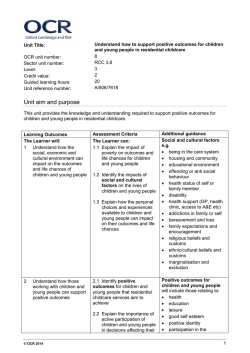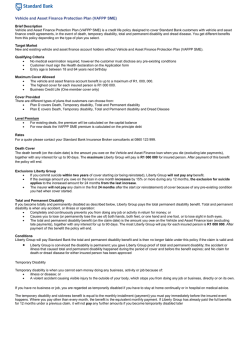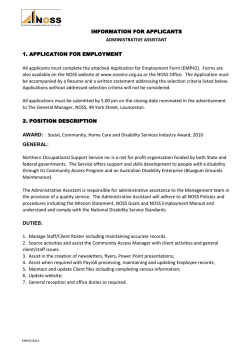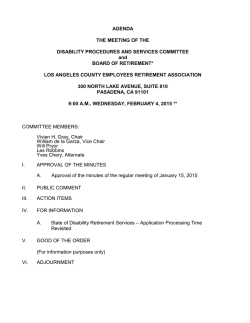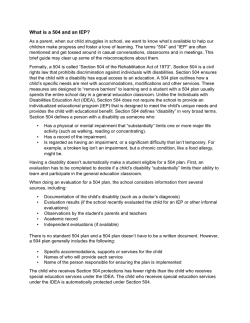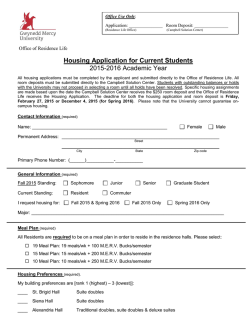
AHEAD 2015 1.3 Disability Studies 101
Intro to Disability Studies WHAT PROFESSIONALS WANT TO KNOW SUSAN MANN DOLCE PH.D Background Associate Director of Accessibility Resources at the University at Buffalo; with a very strong interest in Disability Studies but NOT a Disability Studies Scholar. I am always learning and trying new things. All of the books and activities we will discuss today I have read and/or incorporated into my professional work. Co-chair of AHEAD Disability Studies Special Interest Group (DS/SIG) with Karen Pettus from University South Carolina. The DS/SIG webpage is at http://ahead.org/sigs/disability-studies Work collaboratively on various projects and events with Dr. Michael Rembis at UB Department of History and Center for Disability Studies (CDS). The CDS website is at http://disabilitystudies.buffalo.edu/index.php The AHEAD 2014 Disability Studies Special Interest Group meeting participants identified many of the topics in this presentation as important for professionals to know. Issues of Language Language is fundamentally important and deserves attention in our work. Many times issues of what is the “correct language” to use monopolizes our conversations and work. One of the slogans of Disability Studies is “Nothing about us without us”, the idea that no policy should be decided by any representative without the full and direct participation of members the group(s) affected by that policy. In our office we strive to ask the students we work with what language they use and/or prefer. How do we refer to the students we work with? What is the name of our office? How do we describe our work to our colleagues and friends and families? What is the language on our office websites? Politicized Identity Identity politics. Disability Studies scholars and advocates have written numerous essays on disability as a politicized identity that you can find through a web search. Disability as a politicized identity is one area of focus in Disability Studies. At the University at Buffalo we currently call our office Accessibility Resources based on asking students and an analysis of the work we do (changed from Disability Services in 2012). Some of the students we work with choose disability as a politicized identity and some do not consider themselves to have a disability, and then there are students who fall in between, or who evolve in how they think about their identity. We endeavor to use “person choice language” similar to LGBTQ individuals. We endeavor to provide options for students. For example, on our Universal Design Yoga questionnaires done at the end of each class students may say they have a disability, or may choose to say they utilize Accessibility Resources, both, or neither. What is Disability Studies? Disability Studies uses an interdisciplinary, multidisciplinary approach. Disability sits at the intersection of many overlapping disciplines in the humanities, sciences, and social sciences. Programs in Disability Studies encourage a curriculum that allows students, activists, teachers, artists, practitioners, and researchers to engage the subject matter from various disciplinary perspectives. Studying national and international perspectives, policies, literature, culture, and history with an aim of placing current ideas of disability within their broadest possible context. Since attitudes toward disability have not been the same across times and places, much can be gained by learning from these other experiences. This presentation focuses on the United States. Disability Studies encourages participation by disabled students and faculty, and ensuring physical and intellectual access. This information is from the Society for Disability Studies (SDS) website that is at the following link: https://www.disstudies.org/about/what_is_ds Disability Studies Programs Universities have long studied the disabled in medical and health care curriculums. But when the first disability studies program emerged at Syracuse University in 1994, it was a radical departure from the medical model that had dominated offerings for decades and had approached disability as a deficit that needed fixing. Like black studies, women’s studies and other liberation-movement disciplines, disability studies teaches that it is an unaccepting society that needs normalizing, not the minority group. “Disablement comes from a confluence of social factors that shape one’s identity,” says Tammy Berberi, (recent past) president of the Society for Disability Studies. The above excerpts are from a November 2013 New York times article discussing Disability Studies Programs is at the following link http://www.nytimes.com/2013/11/03/education/edlife/disability-studies-a-newnormal.html?_r=0 Academic Disciplines Over 35 Colleges and Universities offer graduate and undergraduate degrees, minors and certificates. Not all programs approach Disability Studies in the same way, or agree on what constitutes a successful program. Programs may vary based on the origins of the program and where it is housed in the institution. The SDS website states that Disability Studies prioritizes leadership positions held by disabled people; and that at the same time, it is important to create an environment where contributions from anyone who shares Disability Studies goals are welcome. Some departments where there may be a formal program or classes that are informed by Disability Studies include: Modern Languages, Art, Dance, Comparative Literature, History, Education, Rehabilitation Counseling, Anthropology, Architecture, Design, Philosophy, Ethics/Bioethics etc. Disability Studies Programs (just a few) University of Washington offers an undergraduate minor. Temple University offers a graduate certificate. Syracuse University offers a graduate certificate. Ohio State University offers an undergraduate minor and a graduate specialization. University of Hawaii at Manoa offers a graduate certificate. University of Illinois- Chicago offers an MS or a PhD. CUNY City University of New York School of Professional Studies offers graduate certificate, masters and a 100% online bachelors degree. University at Buffalo offers a graduate certificate. History of Disability in the United States Nielsen, Kim E., A Disability History of the United States. Boston: Beacon Press, 2012 An article by Kim in the Disability Studies Quarterly is at the following link: http://dsqsds.org/article/view/107/107 Burch, Susan & Hannah Joyner. Unspeakable: The Story of Junius Wilson. Chapel Hill, NC: University of North Carolina Press, 2007. 304 pages. A review of Unspeakable in the Disability Studies Quarterly is at the following link: http://dsqsds.org/article/view/1352/1471 Susan Burch, ed. Encyclopedia of American Disability History. Facts on File, Inc.: New York, NY. 2009. A review of the Encyclopedia of American Disability History in the Disability Studies Quarterly is at the following link: http://dsq-sds.org/article/view/1291/1322 Theoretical Orientations Disability Models provide a framework for understanding Disability Studies as well as our work as professionals. Disability Models assists professionals in understanding their perspective(s) regarding the mission of our offices and the services we provide and the campus activities we engage in. As we work through the following list of Disability Models (only a partial list) reflect on how you personally and professionally regard each of the models. As we review the Disability Models reflect on their relationship with an ableist perspective. What is Ableism? Ableism – the practices and dominant attitudes in society that devalue and limit the potential of persons with disabilities. Ableism - a set of practices and beliefs that assign inferior value (worth) to people who have developmental, emotional, physical, sensory or psychiatric disabilities. An ableist society is said to be one that treats non-disabled individuals as the standard of ‘normal living’, which results in public and private places and services, education, and social work that are built to serve 'standard' people, thereby inherently excluding those with various disabilities. Persons with disabilities face many kinds of barriers on a daily basis. These can be physical, attitudinal or systemic. The above info is from the stop ableism website at the following link: http://stopableism.org/what.asp Models of Disability The following models are found at the disabled world link at http://www.disabledworld.com/definitions/disability-models.php The Medical Model of Disability: The Medical Model is presented as viewing disability as a problem of the person, directly caused by disease, trauma, or other health condition which therefore requires sustained medical care provided in the form of individual treatment by professionals. In the medical model, management of the disability is aimed at a "cure," or the individual’s adjustment and behavioral change that would lead to an "almost-cure" or effective cure. In the Medical Model, medical care is viewed as the main issue, and at the political level, the principal response is that of modifying or reforming healthcare policy. Disability Models Continued The Social (Justice) Model of Disability: The Social Model of disability sees the issue of "disability" as a socially created problem and a matter of the full integration of individuals into society. In this model, disability is not an attribute of an individual, but rather a complex collection of conditions, many of which are created by the social environment. Hence, the management of the problem requires social action and is the collective responsibility of society at large to make the environmental modifications necessary for the full participation of people with disabilities in all areas of social life. The issue is both cultural and ideological, requiring individual, community, and large-scale social change. From this perspective, equal access for someone with a “variation” is a human rights issue of major concern. Related to the Civil Rights Model of Disability Disability Models Continued The Expert or Professional Model of Disability: This model has provided a traditional response to disability issues and can be seen as an offshoot of the medical model. Within its framework, professionals follow a process of identifying an impairment and its limitations (using the medical model), and taking the necessary action to improve (normalize) the position of the disabled person. This has tended to produce a system in which an authoritarian, over-active service provider prescribes and acts for a passive client. The Tragedy and/or Charity Model of Disability: Depicts disabled people as victims of circumstance who are deserving of pity. This, along with the medical model, are the models most used by non-disabled people to define and explain disability. Disability Models Continued The Moral Model of Disability: Refers to the attitude that people are morally responsible for their own, or their child’s disability. For example, the disability may be seen as a result of bad actions by parents if congenital. Some belief systems may reinforce these ideas in subtle or not so subtle ways. The Economic Model of Disability: Defines disability by a person’s inability to participate in work. It also assesses the degree to which impairment affects an individual’s productivity and the economic consequences for the individual, employer and the state. Such consequences include loss of earnings for and payment for assistance by the individual; lower profit margins for the employer; and state welfare payments. This model is directly related to the charity/tragedy model. Disability Studies and the Law Our work of providing reasonable accommodations is based on the law so in many ways this is an area with which professionals are familiar. Disability Studies includes analysis of law through different perspectives in addition to sections 504 and 508 of the Rehabilitation of 1973 and the ADA (1990) and ADAAA (2012). An interesting book about disability and the law is Susan M. Schweik, The Ugly Laws: Disability in Public. New York and London: New York University Press, 2009. A review of this book from the Disability Studies Quarterly is at the following link: http://dsq-sds.org/article/view/1258/1290 I incorporate information about the Ugly Laws into a class I teach in conjunction with the movie “The Music Within” in which use of the Ugly Laws is depicted. The movie has received 1.5 – 4 stars from various critics. I find it useful for an introductory college class, every student I have shown it to has liked it and learned Disability Studies related information from watching the movie. The following link contains more information about the movie: http://www.imdb.com/title/tt0422783/ Disability Studies and the Media Disability and the Media is important and intersects with other aspects of Disability Studies. Beth Haller is a Disability Studies Scholar who focuses on disability and the media. . A short video of Beth at the Disability Education and Advocacy Network (DEAN) Disability and the Media Conference go to the UB Accessibility Resources link at https://www.youtube.com/watch?v=oP27M7tRb7Y&list=PL3216C9DE23ECB313&index=10 I strongly recommend Haller, Beth. Representing Disability in an Ableist World: Essays on Mass Media. Louisville, KY: The Avocado Press, 2010. A review of this book in the Disability Studies Quarterly is at the following link: http://dsq-sds.org/article/view/1585/1553 Beth also has a Facebook page entitled “teaching disability studies” that has almost 1700 members. Join this Facebook group for interesting and useful information and to ask questions. The link to the Facebook group is https://www.facebook.com/groups/815091775182425/ Searching Social Media is a wonderful way to learn about different perspectives on issues related to Disability Studies as well as distributing information. Disability Studies and Universal Design “Universal Design (Inclusive Design) is a process that enables and empowers a diverse population by improving human performance, health and wellness and social participation.” This definition is from the Inclusive Design and Environmental Access (IDEA) Center at UB. Information about the IDEA is at their website at the following link: http://idea.ap.buffalo.edu/home/index.asp Providing individual reasonable accommodations when places, events, pedagogy, programs, videos and other aspects of life are not Universally Designed is an important part of the work we do. The more Universally Designed all aspects of life are, the fewer reasonable accommodations will be needed. What do YOU think about this? How does YOUR OFFICE approach this? Do our offices have a role in how our campuses approach this? 10 Ways to Link Disability Studies to Professional Services 1. Review your office mission and vision and discuss what theoretical orientation it reflects and why. How does the work you do align with Disability Studies? Are there ways to accomplish your mission that is more informed by Disability Studies? 2. Review your website and consider redesigning in a way that reflects a Disability Studies perspective. 3. Explore who is interested in Disability Studies on your campus and community. Reach out to your allies: meet with them, attend events, teach in their classes and invite them to teach in your classes. 4. Screen a Disability Studies informed movie/discussion on campus. This year we showed “Fixed”, which was well attended and provided a forum for discussion. Information about the movie “FIXED” is at the following link: http://www.fixedthemovie.com/ 5. If your campus has a book club for faculty and staff or a selected campus wide book recommend a disability themed book. In 2012 we read “Waking” at UB as part of the Student Affairs book club. Matthew Sanford, the author came to campus and discussed the book. Information about Waking is at the following link http://www.amazon.com/Waking-A-Memoir-TraumaTranscendence/dp/159486845X 10 Ways to link Disability Studies to Professional Services 6. As professionals we are often called upon to collaborate on events to raise awareness about Disability. A good strategy is to use the book (I keep extra copies to lend to other offices) Disability Awareness: Do It Right. Information about this helpful book is at the following link http://www.advocadopress.org/?p=2728 7. Post Disability Studies events on campus and in your community on your website and other social media. 8. Sponsor a Disability Studies discussion group for interested students, faculty and staff. 9. Join the Society for Disability Studies and if possible attend their annual conference. It is definitely one of the ways I have learned the most about the broadness and diversity of Disability Studies. 10. Attend the Disability Studies SIG and one or more of preconference or concurrent sessions informed by Disability Studies at the AHEAD annual conference. One More Idea Explore opportunities to teach a class on campus into which you are able to introduce Disability Studies themes. It might be a one credit experiential class or a three credit class. You may coteach or teach alone. For 16 semesters I have taught a class entitled “Universal Design Programming and Yoga”. It is a three credit “experiential” learning class. Many of the activities and readings discussed today are incorporated into this class. If you are interested in the class syllabus or discussing anything about the class please e-mail me at [email protected] Society for Disability Studies The Society for Disability Studies (SDS) is a scholarly organization for people involved in disability studies. SDS holds an annual conference and publishes a quarterly journal. There is also a disability studies archive of articles published by Leeds University in the UK. Disability Studies Quarterly (DSQ) is the journal of the Society for Disability Studies (SDS). It is a multidisciplinary and international journal of interest to social scientists, scholars in the humanities, disability rights advocates, creative writers, and others concerned with the issues of people with disabilities. It represents the full range of methods, epistemologies, perspectives, and content that the multidisciplinary field of disability studies embraces. DSQ is committed to developing theoretical and practical knowledge about disability and to promoting the full and equal participation of persons with disabilities in society. The Society for Disability Studies website is at the following link: https://www.disstudies.org/ Questions & Contact Info For questions or comments I can be reached at the following e-mail address: [email protected] or phone number: 716 645-2608. University at Buffalo Accessibility Resources website has videos about Disability Studies informed projects and events developed and participated in by students in the Universal Design Programming and Yoga class. The videos are at the following link: https://www.youtube.com/playlist?list=PL3216C9DE23ECB313 Thank you.
© Copyright 2026
